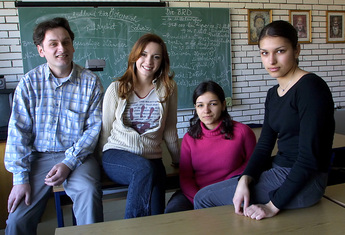Newsletter: Fall 2011 - College Alternatives
Not every high school senior is ready to move on to college. Sometimes, students finishing high school need a bit more time to mature and to develop the skills that will enable them to thrive in the more independent setting of a four-year or community college. Sometimes, students have learning difficulties which will make it difficult for them to meet the academic demands of college, even with appropriate accommodations and supports. And sometimes, students have a specific career goal in mind that is best reached by something other than a typical college program. Fortunately, there are numerous alternative paths and programs available that students and their families may want to consider.
Gap Year Programs Even students who are sure they want to attend college and have been accepted at the school of their choice may want to defer admission for a year to travel or explore an area of interest. Most colleges will readily permit this for a student who has a specific plan in mind. For students who are not ready to apply to college, there are a number of gap-year programs, some focusing on work or travel experiences and others on connecting students to college programs while fostering independent living. Some of these programs, such as the College Internship Program or the College Living Experience, are specifically designed for students with learning or social difficulties. Other programs are designed to serve as an alternative to college for students who aren’t sure about continuing their studies or who need a bit more time to acquire maturity and focus. Programs such as those from AFS (formerly American Field Service) offer service opportunities in other countries for high school graduates. Certificate Programs Students with serious learning difficulties, for whom the academic expectations of college may be problematic, can have a college-like experience with a modified curriculum at a program that offers a certificate, rather than a diploma. These programs are generally situated on a college campus, and focus on preparing students for the workplace and for full, independent lives. They include an emphasis on such areas as social skills and personal finance and they often involve students in internships and career opportunities to help them prepare for the real world. They are designed to run from two to four years, which time can vary depending on a particular student’s needs and preferences. Two excellent programs we have visited are the Threshold Program at Lesley University in Cambridge, Massachusetts and the Vocational Independence Program at New York Institute of Technology on Long Island, New York. Another kind of certificate program has a different focus – to serve as the bridge between high school and college for students who plan to attend college but are not prepared to do so right after high school for academic, social, or personal reasons. These students may have learning difficulties and need to work on academic skills, or they may have difficulty with social skills and need to “ease into” college with a more supportive program. An example of this kind of certificate program is a one-year program on the campus of Mitchell College, in New London, Connecticut, called Thames Academy, which allows students to earn up to 20 credits at Mitchell College. We have experience with this program and have seen it help students move on to a successful college experience. Secondary Settings A number of secondary boarding schools have established programs for their graduates – and other students – that offer either transition to college or serve as a self-contained certificate program. Some of these are designed for student athletes who need to burnish their academic or athletic skills to be accepted into a competitive college program. Other programs are affiliated with secondary schools for students with learning differences. These run the gamut from certificate programs that focus on life skills to those that are designed to provide support for students while they are attending community college. One program with which we are familiar is at Brehm Preparatory School in Carbondale, Illinois, a secondary boarding school for students with complex learning difficulties. Brehm offers an OPTIONS program, which they describe as being for high school graduates [from Brehm or elsewhere] who “…have potential to be successful in the college or employment environment, but cannot demonstrate it, as they have not mastered the skill sets necessary to negotiate college or successful employment.” Vocational Programs Technical or culinary education can serve as a path to a satisfying career for students who prefer a more practical path over a typical academic program. For students who are considering this post-secondary choice, there are often opportunities while still in high school to explore their interest. New York State’s BOCES centers, for example, combine the resources of regional school districts to provide educational opportunities in fields ranging from electrical or automotive engineering to cooking. These programs can be a step towards a college education or serve as the training necessary to qualify for a satisfying career. Whatever path a student takes to complete his or her education, all involved should keep in mind that there is no one correct route for everyone. One drawback to most of the programs we mention is that they can cost as much – or more – as a year of college. They offer little in the way of financial aid and this can be a barrier for many families. Keeping in mind a particular student’s strengths, challenges, and interests, as well as family resources, can help families choose the right next step for their high school seniors. --Susan Yellin, Esq. |

